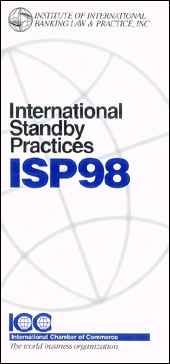ISP 98: Standby Letters of Credit Rules
ISP 98 is the set of rules that governs standby letters of credit. They have been published by ICC Banking Commission. ISP 98 – International Standby Practices ICC Publication No. 590 , 1998 Edition. ISP 98 is in force as of January 1, 1999
ISP 98 – International Standby Practices is the title of the book that is published by ICC to govern the standby letters of credit transactions (SBLC ).
ISP 98 consists of 76 pages in total. Full details of ISP 98 for ordering considerations are as follows : ISP 98 – International Standby Practices ICC Publication No. 590 , 1998 Edition. ISP 98 is in force as of January 1, 1999.
How to Buy ISP 98?
ISP 98 is both available by e-book format and hard copy. It is sold under online ICC Bookstores. You can buy ISP 98 from this link.
Benefit of ISP 98 – International Standby Practices
ISP 98 International Standby Practices was written exclusively for standby letters of credit.
Prior to ISP 98 standby letters of credit were issued under commercial letters of credit rules. This was not an effective way as standby letters of credit and commercial letters of credit have significant differences with regards to scope and practice.
ISP 98 has been reduced the cost and time of drafting, limit problems in handling and avoid countless disputes and unnecessary litigation that have resulted from the absence of internationally agreed rules on standby letters of credit.
International Standby Practices fills an important gap in the market place.
The 98 Rules in International Standby Practices (ISP98) offer a precise and detailed framework for practitioners dealing with standby letters of credit.
Developed by the Institute of International Banking Law and Practice, endorsed and published by the International Chamber of Commerce (ICC), ISP98 is the standardized text for the use of standbys worldwide.
ISP98 Rules
- contain precise definitions of key terms such as “original” and “automatic amendment”
- cover in detail the standby process from “Obligations” to “Syndication”
- provide neutral rules acceptable in most situations
- save both time and money in negotiating and drafting standby terms
- help avoid litigation and unexpected loss
- propose basic definitions should the standby involve presentation of documents by electronic means
- provide international standards for the use of this fast growing financial instrument
Table of Contents
- Rule 1 General Provisions
- Rule 2 Obligations
- Rule 3 Presentations
- Rule 4 Examination
- Rule 5 Notice, Preclusion, and Disposition of Documents
- Rule 6 Transfer, Assignment, and Transfer by Operation of Law
- Rule 7 Cancellation
- Rule 8 Reimbursement Obligations
- Rule 9 Timing
- Rule 10 Syndication/Participation
